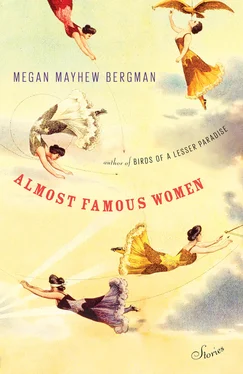You brute! The water is frigid, she complained, her body stiff in the cloudy tub, breasts drooping below the waterline. I’ll die of cold.
She tells him to wake her if she sleeps during the day, that she does not like to sleep, that she has nightmares from childhood. But he never wakes her. One time he did and she accused him of touching her inappropriately.
You put your hands underneath my blouse, she said, snarling. Her right eye floated slightly away from the intended line of her gaze, as it always had.
Cristo! I would never , he exclaimed, backing away, his hands up in protest. His disgust was evident to Romaine and enraged her even more.
I’ll have you arrested! she said, but her voice was hoarse and raspy and came out as a whisper. I was a beautiful woman, she said, lip curling. I had many lovers.
She’s feeble but threatening, and he has to take her seriously; he needs this job, and she knows it. He made the mistake of telling her. No one ever works for Romaine longer than six months. She’s too demanding, too proud, too suspicious. Last year she fired everyone and a nurse found her shivering in bed, weak from having not eaten for four days. What the nurse told him his first day of work: Romaine would rather die than compromise.
Mario tells his mother, who is eighty-six, that Romaine is ninety-three and has a closet full of silk opera capes. She doesn’t wear glasses, he says.
She’s paid for new eyes?
No, Mario says. She’s more stubborn than blindness itself.
Mario lives with his Spanish mother in a one-room flat in Fiesole; she had envisioned it as a paradise, but it did not feel this way. She takes on laundry and mending, and he often finds her hunched over the tub, swirling someone else’s pants in the dull water. He’d grown up in Haro, Spain, and hoped to become a literature student, maybe a teacher, but his father died and his brothers were off working in the vineyards of Serralunga d’Alba. Someone had to stay home and care for Mama, even if she was tiresome, full of outdated gossip and complaints about the arthritis in her worn knuckles.
How did I come to spend all my time with two old women? Mario wonders, hating his life, hating his conscience for keeping him home when he’d been the studious one in the family. He’d stayed up many nights, chewing licorice and drinking weak coffee, poring over the old encyclopedias his aunt had given him. He was supposed to escape, not his brothers. He was supposed to fall in love, grab happiness by the throat.
I wish she would die, Mario thinks, looking at Romaine’s limp body, the silver hairs on her upper lip, but he knows he’d have to go back to busing tables, bleaching napkins, cutting the mold off cheese rinds. Because Romaine sleeps so much Mario can read books and Enzo, the cook, can drop acid and organize radical political meetings in the galley kitchen, drinking up Romaine’s Barolos with his communist friends, thumping the ashes from his cigarette into her gnocchi.
Today her lunch, tomato soup and croquettes, is untouched on the tray, which she has pushed into the corner so as not to smell it. As far as he can tell, Romaine takes joy in nothing. She turns friends away, leaves letters unopened.
He tiptoes toward the door, hoping to get back to his novel, Caproni’s translation of Céline’s Death on Credit.
Mario!
She’s awake. He sighs.
Can’t you see that I’m doing my exercises?
Mi scusi.
She looks to the right, a hard right. Then to the left. She’s exact in her movements; she’s been doing these exercises daily for thirty years. Down, around, repeat. Now angles. Now close and far away.
Mario hears the neighbor’s rottweiler barking. The dog sits on the rooftop patio across from Romaine’s bedroom, howling at ambulances, barking for hours. Once the dog starts he can’t quit.
You must make the dog stop, Romaine says, holding her trembling fingers to her temples.
Mario has tried explaining that he can’t make the dog stop barking, but Romaine expects the impossible. So he opens the doors onto Romaine’s terrace and yells at the thick-necked dog, who only barks harder and louder upon seeing Mario, frothing at the mouth, placing his front paws on the planters filled with red begonias. Vaffanculo , Mario mutters.
He picks up the broom they leave on the terrace and sweeps the dead blossoms from the terra-cotta tiles; as soon as the sun goes down Romaine will take her wine out here, as long as the dog is quiet. How can she be so paranoid when she can have anything she wants? he wonders.
When he comes inside Romaine is staring at the wall.
Should I set up your paints? he asks.
This question is a formality. Romaine has not painted in forty years.

Enzo is chopping a spoiled onion, wild-eyed as usual, shirt unbuttoned, glass of Barolo precariously placed on the marble chopping block. He has two bags of carrots nearby, which he will make into the juice that Romaine drinks twice daily for her eyesight.
Ecco! he says, sweating, laughing, always laughing. È la domestica!
I’m a student.
You’re a nurse! To an old woman with droopy tits and a mouth like a marinaio .
Zitto.
Do you have to wipe her ass? What’s it like?
Mario ignores Enzo and collects the mail, opening the complex series of bolts Romaine has ordered installed on the door. Among her many paranoias: theft, blindness, and the belief that trees try to feed off one’s “life force.”
Romaine is not kind, but she is interesting; he will allow her that. Every week there’s a letter from an art dealer in New York, hoping, no begging , for some of Romaine’s work. She never responds.
An envelope stands out in today’s stack: expensive lavender card stock, perfumed and embossed with a lily. He knows this stationery. It comes from Paris, from a woman named Natalie. He knows what will happen. He’ll take these letters to Romaine on her dinner tray and she’ll toss them on the floor or leave them underneath her silverware. Some days she painstakingly marks the envelope to be returned to sender: “Miss Barney — Paris.”
Mario usually reads the letters in the kitchen on his lunch break. Natalie’s are his favorites; she seems to know she’s having a one-sided conversation, that Romaine will never answer. She writes of the war, of the time twenty-odd years ago when she and Romaine were living in a Tuscan villa, gardening like peasants just to feed themselves. Her sentences move from hemorrhoid management to oral sex. Natalie is, from what he can tell, an elderly woman with an active libido.
Tonight, instead of taking the letter to Romaine, he puts it into his coat pocket and, after checking on his mother, reads it in bed, carefully unfolding the stationery. A lock of silver hair falls to the sheets. He scoops it up and places it on the bedside table.
I’m hungry for you. Old you, new you. Do you remember the ways we used to make love? And how often? Do you remember the way I used to reach inside your gown in the back room of a party? Do you remember the things we did under the table, my hand between your legs, the other wrapped around a glass of wine? And how people thought we were smiling at them, that our ecstatic faces were for them, but they never were…
The letter makes him feel — God, how does it make him feel?
As though there is vitality in the world, and he does not have it, he has never even tasted it in his mouth. He has never lived the way he wants to live, never felt in control, or able to express his desire for people and things. For men in new leather shoes drinking wine at the hotel bar, or the boys standing outside the less reputable discotecas smoking cigarettes. He has never been explicitly himself.
Читать дальше













